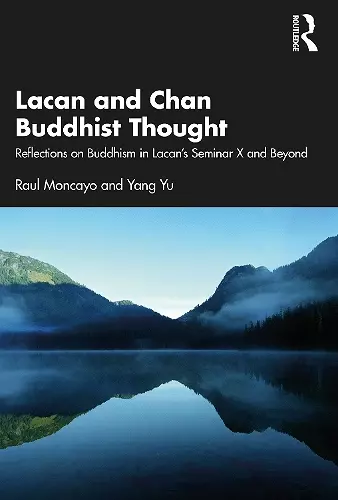Lacan and Chan Buddhist Thought
Reflections on Buddhism in Lacan’s Seminar X and Beyond
Yang Yu author Raul Moncayo author
Format:Paperback
Publisher:Taylor & Francis Ltd
Published:23rd Dec '22
Currently unavailable, and unfortunately no date known when it will be back
This paperback is available in another edition too:
- Hardback£130.00(9781032056968)

Lacan and Chan Buddhist Thought provides a close reading of how Lacan mobilizes concepts from Chan Buddhist philosophy, culture, and practice in his later teachings.
The book emerged from the three co-authors’ engagement with Lacan’s 1962–1963 Seminar on Anxiety, and the significance of Lacan’s original interpretation of the Buddhist principle that desire is the cause of suffering. The book reads key Lacanian concepts – such as the objet a, jouissance, the real, Nirvana, and the mirror – through ancient Buddhist teachings and koans. With this focused exploration of psychoanalysis and Chan Buddhism, the authors offer a philosophically grounded cross-cultural approach to the theory and practice of psychoanalysis in Asian countries.
Lacan and Chan Buddhist Thought will be a rich resource for psychoanalysts, academics, and students interested in Lacan and religion, the intellectual and cultural relationship between Asian and Western thought, and Mahayana Buddhism more generally.
"This book is one of the clearest and most interesting introductions to Lacan. Since Chinese people are familiar with Buddhist thought, interpreting Lacan from this perspective makes the reader feel especially at home and helps to understand some of Lacan's extremely difficult concepts. This book is very suitable for Chinese readers to study Lacan and the writers present Lacan with such depth and lightness that the reader will find it a pleasure to read. The interpretation of the name Lackhan is very helpful in understanding the two otherness inside and outside the subject, as well the explication of the concepts of jouissance, pleasure, and the Real are very illuminative and greatly clarify their complexities. In the works published in China on Lacan, there are only a few references to the relationship between Lacan's thought and Buddhism which are not so systematic. Therefore, this book, and eventually a Chinese translation, will have a great academic impact that will not only help to popularize Lacanian theory in China, but also orients a new trend in studying Lacan." - Xiaoyi Zhou, Peking university. Dr. Zhou earned his doctorate at Lancaster University in 1993, and has published widely on comparative literature and literary theory.
"What a treat to read this profound, careful, and creative exploration of Lacan and Chan Buddhism. East-West illuminate and add to each other, amplifying Lacan's vocabulary and concepts and Chan's existential evocations. It was not a surprise to see YHVH in the glossary touching a dimension beyond name and thought in the usual sense. And although Bion was not part of this work, his emphasis on the creative unknown vibrates with it. Unconscious to unconscious, psyche to psyche, mind to mind—so much permeates and enriches. This book opens many doors and passageways and gives us much to think about, experience and digest." - Michael Eigen, PhD., New York University Postdoctoral Program in Psychotherapy and Psychoanalysis (adjunct) and the National Psychological Association for Psychoanalysis
"This book is one of the clearest and most interesting introductions to Lacan. Since Chinese people are familiar with Buddhist thought, interpreting Lacan from this perspective makes the reader feel especially at home and helps to understand some of Lacan's extremely difficult concepts. This book is very suitable for Chinese readers to study Lacan and the writers present Lacan with such depth and lightness that the reader will find it a pleasure to read. The interpretation of the name Lackhan is very helpful in understanding the two otherness inside and outside the subject, as well the explication of the concepts of jouissance, pleasure, and the Real are very illuminative and greatly clarify their complexities. In the works published in China on Lacan, there are only a few references to the relationship between Lacan's thought and Buddhism which are not so systematic. Therefore, this book, and eventually a Chinese translation, will have a great academic impact that will not only help to popularize Lacanian theory in China, but also orients a new trend in studying Lacan." - Xiaoyi Zhou, Peking university. Dr. Zhou earned his doctorate at Lancaster University in 1993, and has published widely on comparative literature and literary theory.
"What a treat to read this profound, careful, and creative exploration of Lacan and Chan Buddhism. East-West illuminate and add to each other, amplifying Lacan's vocabulary and concepts and Chan's existential evocations. It was not a surprise to see YHVH in the glossary touching a dimension beyond name and thought in the usual sense. And although Bion was not part of this work, his emphasis on the creative unknown vibrates with it. Unconscious to unconscious, psyche to psyche, mind to mind—so much permeates and enriches. This book opens many doors and passageways and gives us much to think about, experience and digest." - Michael Eigen, PhD., New York University Postdoctoral Program in Psychotherapy and Psychoanalysis (adjunct) and the National Psychological Association for Psychoanalysis
ISBN: 9781032056975
Dimensions: unknown
Weight: 453g
98 pages